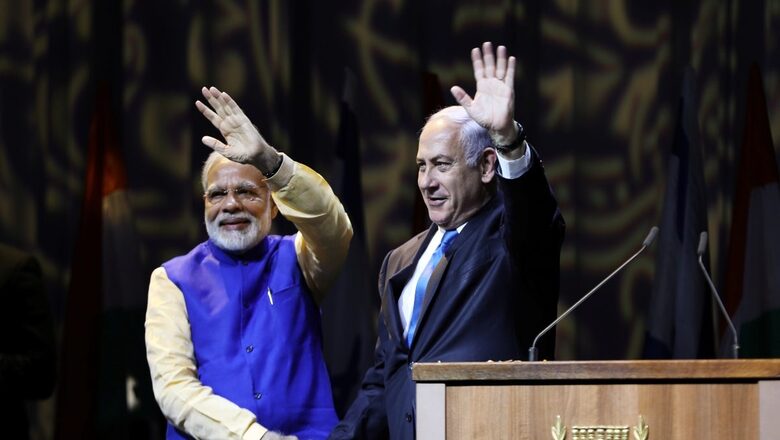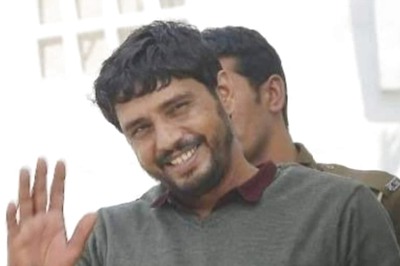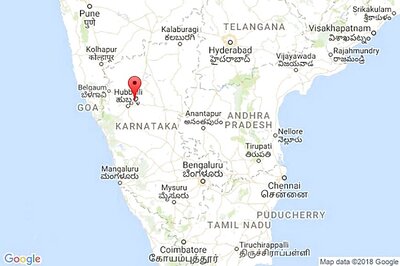
views
Indian Prime Minister Narendra Modi’s support for Israel amid the ghastly terror attack mounted by Hamas, the Palestinian terror group controlling the Gaza Strip, is a significant shift in how India sees the Israel-Palestine conflict. The prime minister referred to the incursions as “terrorist attacks” and affirmed that India stands “in solidarity with Israel” in a post on ‘X’, formerly known as Twitter, that came within a few hours after the news of the attacks broke out.
The statement calling it a terrorist attack is a confirmation that India has taken a side and this position is consistent with India’s anti-terrorism stand. PM Modi’s statement was similar to his Western counterparts with the unambiguous reference to Hamas’ transgressions as terrorism. While India maintains its position in favour of the Palestinian cause, the nature of the attack bearing resemblances to the 26/11 Mumbai terror attack with infiltrators massacring civilians, appears to have compelled India to take a swift and unequivocal position in favour of Israel at this juncture, in consistence with India’s anti-terrorism stance on all global platforms.
India is familiar with the wrath of Islamist terror, with thousands of lives lost to innumerable attacks including major bomb blasts and terror attacks emanating from Pakistan. The sheer scale, sophistication and brutality of Hamas’ attack has the potential to embolden Islamist terrorists across the border in Pakistan.
It is also important to tell apart the radical Islamist Hamas leadership in Gaza, southwest of Israel, which is in stark contrast with the moderate Fatah leadership of the Palestinian Authority in Ramallah in the West Bank in the east. Hamas expelled the Palestinian Authority in Gaza in a coup in 2007, two years after Israel pulled out its forces from the exclave.
While extremist supporters of the Palestinian cause around the world stepped out to celebrate the unprecedented and barbaric attacks on Israelis, the cue from Prime Minister Modi in India was that such a horrific terrorist attack aimed at civilians— women, children and the elderly alike— cannot be justified with past or pre-existing grievances.
However, there is much more at play as India has a direct stake here. Israel is a crucial part of the India-Middle East-Europe Economic Corridor or IMEC, an ambitious transcontinental transit infrastructure project launched on the sidelines of the G20 summit in New Delhi. IMEC hinges on a peaceful West Asia, and more particularly on the normalisation of ties between Israel and Saudi Arabia, which was almost imminent until Hamas’ deadly attack provoked Israel to declare an all-out war.
The window for Saudi Arabia to sell this progressive measure to its people while restricting Palestine to the periphery is quite possibly closed with the Palestine question taking centre stage. Given the heightened polarising reactions, especially in the Muslim world, the possibility of a Saudi-Israel Abraham Accord has been effectively scuttled. And with this, so is the IMEC. In fact, Hamas’ attack is meant to sabotage this very geopolitical development. It is another matter that Hamas’ savagery may have axed the world’s sympathy for the Palestinian cause, denting the movement for the long haul.
India’s response shows the deepening of strategic and military ties with Israel, as they are collaborators alongside the United States and the United Arab Emirates in the I2U2 infrastructure and strategic partnership.
While India was one of the first non-Arab supporters of the Palestinian cause and has sent millions of dollars in aid for Palestinians, it has been gravitating closer towards Israel in the last three decades since the fall of the Soviet Union and improved relations with the United States. That has accelerated since PM Modi’s historic visit to Israel in 2017, which was the first time an Indian prime minister travelled to Israel. Today, defence ties between the two are soaring with India also becoming Israel’s top defence buyer.
India has watered down the balancing act between Israel and Palestine, in this case, taking a clear side and calling Hamas’ act terrorism. India is drawing closer strategically towards Israel as it is only natural. Hamas is backed by not just Iran, but Qatar, Turkey and Pakistan. The same forces are inimical to India. And therefore, it makes sense for India to stand with Israel against Hamas.
India’s support for the Palestinian cause stems, in part, from the terms dictated by Arab nations, who have historically felt strongly about the issue. In hindsight, even as India began with an anti-Israel position, it found limited gains from Arab states. What ultimately defined India’s support for the Palestinian cause to the detriment of Israeli sensibilities is the internal political compulsions of previous dispensations in the country. In fact, the Congress party has left a legacy of pro-Palestine passions which it flamed to win favour with the Muslim vote bank. However, of late, India’s relations with much of the Arab world have been flourishing, especially with Saudi Arabia and the UAE and the issue of Palestine has been perceptibly marginalised from the larger equation. The UAE, Bahrain, Sudan and Morocco have already officially embraced Israel. More nations were in the offing to follow, including Saudi Arabia.
All in all, India is drawing closer to Israel having aligned strategically with the country on trade, defence and counter-terrorism. The two have a common enemy in Islamist terror and share a similar vision of a peaceful West Asia with IMEC and I2U2.
Prime Minister Modi is allowing India’s relations with Israel to take their natural course, without outrightly dumping the Palestinian cause, while also calling out the radical methods deployed by its purveyors. This is yet another sign of confidence and clarity in the foreign policy renaissance that India has witnessed in the last few years. India is tending towards scaling down the vague prevarications of its foreign policy and disassociating internal politics with external, all in the pursuit of national interest.
Views expressed in the above piece are personal and solely that of the author. They do not necessarily reflect News18’s views.


















Comments
0 comment